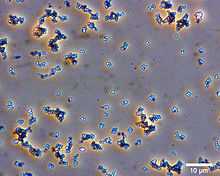Micrococcus luteus
| Micrococcus luteus | |
|---|---|
 | |
| Scientific classification | |
| Kingdom: | Bacteria |
| Phylum: | Actinobacteria |
| Order: | Micrococcales |
| Family: | Micrococcaceae |
| Genus: | Micrococcus |
| Species: | M. luteus |
| Binomial name | |
| Micrococcus luteus (Schroeter 1872) Cohn 1872 | |
Micrococcus luteus is a Gram-positive, to Gram-variable, nonmotile, Coccus, saprotrophic bacterium that belongs to the family Micrococcaceae.[1] It is urease and catalase positive. An obligate aerobe, M. luteus is found in soil, dust, water and air, and as part of the normal flora of the mammalian skin. The bacterium also colonizes the human mouth, mucosae, oropharynx and upper respiratory tract. It was discovered by Sir Alexander Fleming before he discovered Penicillin in 1928.
M. luteus is considered a contaminant in sick patients and is resistant by slowing of major metabolic processes and induction of unique genes. It is a high G + C ratio bacterium.
M. luteus is coagulase negative, bacitracin susceptible, and forms bright yellow colonies on nutrient agar. To confirm it is not Staphylococcus aureus, a bacitracin susceptibility test can be performed.
M. luteus has been shown to survive in oligotrophic environments for extended periods of time. Recent work by Greenblatt et al. demonstrate that Micrococcus luteus has survived for at least 34,000 to 170,000 years on the basis of 16S rRNA analysis, and possibly much longer.[2] It has been recently sequenced and has one of the smallest genomes of free-living actinobacteria sequenced to date, comprising a single circular chromosome of 2,501,097 bp.[3]
Micrococcus luteus was formerly known as Micrococcus lysodeikticus.[4]
In 2003, it was proposed that one strain of Micrococcus luteus, ATCC 9341, be reclassified as Kocuria rhizophila.[5]
Super-Sunscreen
Norwegian researchers in 2013 found "M. luteus" in the Trondheim Fjord with a unique characteristic: a pigment that could absorb wavelengths from 350 to 475 nano-meters. Because of its strong ability to absorb UV radiation, "M. luteus" has been termed the "super-sunscreen" and has been highly sought after by the science community for its beneficial applications. Moreover, it has been widely held that prolonged exposure to long-wavelength UV radiation is correlated with an increase incidence of skin cancer. By being able to extract the gene that creates this strong absorption, scientists can make a resilient sunscreen that can prevent skin cancer from developing in people who are constantly exposed to the sun's rays. The researchers who discovered the bacteria, report that there is currently no sunscreen on the market that absorbs the wavelengths aforementioned.[6]
References
- ↑ Madigan M; Martinko J (editors). (2005). Brock Biology of Microorganisms (11th ed.). Prentice Hall. ISBN 0-13-144329-1.
- ↑ Greenblatt, C.L., Baum, J., Klein, B.Y., Nachshon, S., Koltunov, V., Cano, R.J., (2004). "Micrococcus luteus – Survival in Amber". Microbial Ecology 48 (1): 120–127. doi:10.1007/s00248-003-2016-5. PMID 15164240.
- ↑ Young M, Artsatbanov V, Beller HR, Chandra G, Chater KF, Dover LG, Goh EB, Kahan T, Kaprelyants AS, Kyrpides N, Lapidus A, Lowry SR, Lykidis A, Mahillon J, Markowitz V, Mavromatis K, Mukamolova GV, Oren A, Rokem JS, Smith MC, Young DI, Greenblatt CL (2010). "Genome sequence of the Fleming strain of Micrococcus luteus, a simple free-living actinobacterium". Journal of Bacteriology 192 (3): 841–860. doi:10.1128/JB.01254-09. PMC 2812450. PMID 19948807.
- ↑ Biochemistry 1994,32, 11929-1 1933, http://pubs.acs.org/cgi-bin/abstract.cgi/bichaw/1993/32/i44/f-pdf/f_bi00095a024.pdf
- ↑ Tang, Jane. "Reclassification of ATCC 9341 from Microccus luteus to Kocuria rhizophila". Retrieved 2 March 2011.
- ↑ SINTEF. "Super sunscreen from fjord bacteria." ScienceDaily. ScienceDaily, 6 August 2013. <www.sciencedaily.com/releases/2013/08/130806091556.htm>.
External links
| Wikimedia Commons has media related to Micrococcus luteus. |